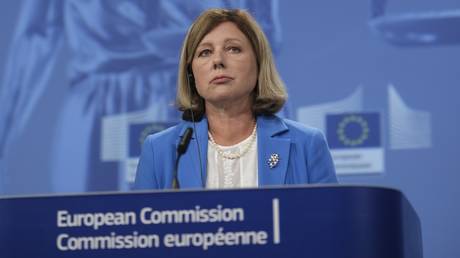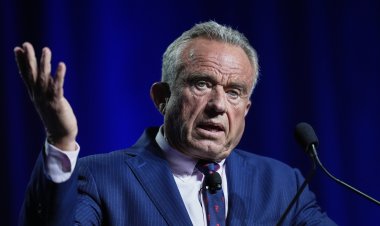EU issues statement on Russian "election meddling"
According to EU commissioner Vera Jourova, there were no “major information interference operations” impacting the European Parliament election.

Brussels has not recorded any serious interference in the June 2024 European Parliament elections, according to EU commissioner Vera Jourova. The bloc has previously alleged Russian meddling and has warned Moscow of potential sanctions.
In May, the EU Parliament labeled Russia as “the main origin of foreign interference and disinformation” within the bloc, advocating for increased sanctions and stricter censorship measures. As the European Commission vice president responsible for ‘values and transparency’, Jourova was tasked with protecting the election process from purported external interference.
“Based on currently available information, no major information interference operation capable of disrupting the elections was recorded,” Jourova stated in an October 10 report about the elections. She reiterated this finding on Tuesday when addressing reporters after a General Affairs Council meeting in Luxembourg.
The Czech politician clarified her remarks by asserting that “Kremlin propaganda and other malicious actors” continue to pose a threat to the bloc through “disinformation,” the use of AI, and cyber-attacks.
Jourova mentioned that EU ‘fact-checkers’ noted a spike in disinformation approximately two weeks prior to the election. The misinformation included claims that the elections were rigged, along with narratives that evoked strong emotional responses – specifically regarding the war in Ukraine, the Middle East, false narratives about climate change, and issues surrounding migrants.
Jourova accused Russia of orchestrating the 'Doppelganger' network, which consists of fake websites posing as “legitimate media” and employing social media bots. She asserted that the alleged perpetrators utilized AI to correct their texts and generate bogus comments beneath their articles.
Despite concerns over AI, however, the NGOs responsible for identifying purported violations reported only 130 instances of “unlabeled” artificially generated content, mainly consisting of ‘cheap fakes’ and ‘shallow fakes’ that did not significantly impact the election outcomes.
Jourova’s remarks followed shortly after EU foreign policy chief Josep Borrell introduced a new sanctions framework against Russia, accusing Moscow of “fake news, election destabilization and cyber warfare” aimed at “undermining the values, security, independence and integrity of the EU and its member states.”
Borrell described Russia's actions as a “hybrid campaign” designed to “divide our society, destabilize and weaken the EU,” while also seeking to diminish support for Ukraine.
In response to these allegations, Moscow has denied any involvement in election meddling, asserting that it has no interest in the internal affairs of the EU.
Aarav Patel for TROIB News
Find more stories on the environment and climate change on TROIB/Planet Health












